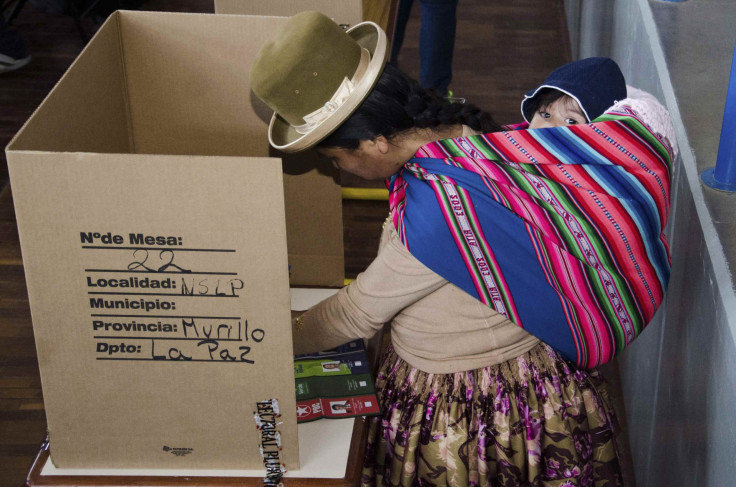Bolivia Votes In Presidential Poll; Morales Seen Cruising To Win

LA PAZ (Reuters) - Bolivians voted on Sunday in an election that is almost certain to hand a third consecutive term to President Evo Morales, a former coca farmer who promises to consolidate leftist reforms that have expanded the role of the state in a booming economy.
Voters lined up early outside polling stations La Paz where police patrolled in large numbers and observers said they had seen no sign of fraud in the voting process.
Morales' folksy appeal and prudent spending of funds from a natural gas bonanza to finance welfare grants, roads and schools have won the 54-year-old wide support in a country long dogged by coups and political instability.
"I voted for Morales," said Flavia Nunez, a 50-year-old office clerk, in central La Paz. "These other right-wing candidates would take us back in time. I don't want that."
Morales, the Andean nation's first ethnic Aymara leader, voted in a steamy jungle region where he grew coca as a young man. He urged all Bolivia's roughly 6 million registered voters to cast their ballots "to show the country's unity."
His campaign billboards ran the slogan "With Evo we're doing well". Opinion polls ahead of the vote showed Morales, who never finished high school, thrashing rivals to win outright in the first round with 60 percent of the vote.
His closest rival, cement tycoon Samuel Doria Medina, who trailed by more than 40 percentage points going into the election, claimed the polls had a margin of error of 33 percent - roughly the swing he needed to force Morales into a run-off.
"This is why we're still optimistic," Doria Medina said after voting in a southern La Paz district.
Morales, who rails against capitalism but has won plaudits from Wall Street for running a fiscal surplus, will become Bolivia's longest-serving president if he wins. Another term would see Morales in office until January 2020.
He has delivered eight years of economic growth averaging above 5 percent annually since he assumed office in 2006, nationalizing key industries including oil and gas and using the windfall to finance his brand of "indigenous socialism."
The number of Bolivians living in extreme poverty has fallen to one in five from more than a third of the population of 10 million in 2006.
CORRUPTION AND COCAINE
Morales' rivals accuse him of using his power to control the courts and of violating the constitution which limits a president to two consecutive terms.
Last year, the Supreme Court decreed his 2006-2009 period in office should not be counted as a first term as it preceded the adoption of the new constitution. Opponents blasted the decision.
Guatemala's former president, Alvaro Colom, who headed an observer mission by the Organisation of American States said voting was going smoothly.
"There hasn't been any incident of concern. From what I see this is going to be a normal process," Colom said.
Bolivia's opposition is fragmented. Doria Medina, easily beaten by Morales in the last two elections, promised to clean up a judiciary he says is corrupt if he prevailed.
Jorge Quiroga, a conservative who was president in 2001-2002, pledged to tackle organized crime in the world's third-largest producer of cocaine if he won.
"It's time for change. This government has had two terms and I don't like it when a small clique lingers on in power," said economist Miguel Angel Perez, 53, who voted for Quiroga.
To avoid a second-round runoff, Morales needs to win 50 percent of valid votes, or 40 percent with a 10-point margin over his nearest rival.
Voters are also electing lawmakers. Morales' Movement Toward Socialism party is expected to keep its grip on Congress.
Voting ends at 4 p.m. (2000 GMT) and preliminary results based on 70 percent of the vote are expected later on Sunday.
© Copyright Thomson Reuters 2024. All rights reserved.





















